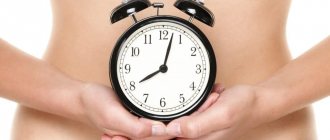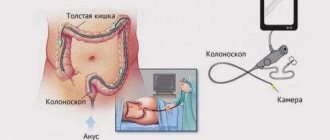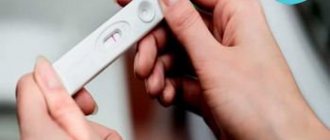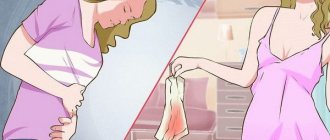Already after unprotected sex or in emergency cases (the condom breaks), you can prevent unwanted pregnancy with the help of emergency contraception. And here the woman begins to wonder what kind of discharge one might encounter after Escapelle, as well as what they are talking about.
It should be understood that each body reacts individually to the same drug, so it is necessary to find out which secretion after Escapel is considered normal and does not threaten health, and which secretions indicate disturbances in processes in the body or incorrect use of emergency contraception. Having all this knowledge, you can not only identify the problem in time, but also prevent undesirable consequences.
Action of the drug and connection with secretions
Emergency postcoital contraception is represented by progestin drugs, which are most effective 24 hours after sex. Escapelle is a modern drug based on levonorgestrel. It is this substance that causes disturbances in gestation and prevents the introduction of the egg into the endometrium. Also, these tablets affect the consistency of mucus in the vagina. It becomes thicker, and therefore it is more difficult for sperm to enter the uterine cavity.
Postinor emergency contraceptive pills have a similar effect, due to the same active ingredient in the composition. You can compare the nature of secretion while taking this drug, especially if you notice bloody spots on the pad. Women on the Internet share information about what they are observing, including... Read about this in one of our articles.
All this can provoke uncharacteristic secretion, which most often alarms a woman. In addition, the discharge may not change its character, but most often there are minor bloody traces on the daily. Bleeding is also possible, which can easily be confused with menstruation.
https://youtu.be/NO9CIWmA8AU
Contraindications
In the instructions for the drug, the manufacturer warns that taking Escapel should be avoided:
- in cases where hypersensitivity to levonorgestrel ;
- patients with lactose intolerance (including impaired absorption of glucose and galactose , galactosemia , lactase deficiency );
- with severe functional liver failure;
- girls under 16 years of age.
intestinal malabsorption syndrome should take Escapelle with caution .
Causes of bloody secretion while taking emergency contraception
Emergency contraception methods are considered very powerful drugs that must be used correctly. In most situations, discharge after taking Escapel is natural, that is, it indicates the effect of the drug. But various violations cannot be ruled out.
Safe
The action of the drug Escapelle is based on a synthetic version of the natural hormone gestagen. Levonorgestrel causes processes in the female body that are similar to the end of the menstrual cycle. It turns out that brown discharge after Escapelle occurs due to rejection of the inner mucous membrane of the uterine body, which is also called the endometrium or mucous layer. This process is considered normal and does not threaten the woman’s health. And it is also commonly called “artificial menstruation.”
Pathological
The presence of blood in vaginal secretion after taking the drug may also indicate pathological processes. Here are several reasons worth paying attention to:
Dose violation
There are often situations when a woman takes first one and then another pill, worrying about the effectiveness of emergency contraception. Doing this is strictly prohibited, otherwise you can get intoxication of the body, as well as hormonal imbalance, which is often accompanied by bloody secretion.
Very frequent use
Only one dose per menstrual cycle is allowed. And some doctors are of the opinion that using Escapel more than once every three months has a negative effect on the reproductive system, causing heavy bleeding of unknown etymology.
Gynecological problems
Situations are possible when bloody secretion is caused not by the use of the drug, but by gynecological diseases. If a woman has uterine fibroids, endometrial pathology and other problems, then Escapelle is likely to provoke bloody discharge against the background of existing diseases of the reproductive system.
Hormonal disorders
Hormonal imbalances after taking Escapel most often occur in very young girls (under 16 years old) or in premenopausal women. Therefore, the tablets are recommended only for patients with regular periods.
Ectopic pregnancy
Characterized by the fixation of the fertilized egg outside the uterine cavity. Accompanied by scanty spotting, also chills and nausea.
During pregnancy
If the drug is used during pregnancy, the active substance levonorgestrel can cause incomplete abortion, which will be accompanied by acute bleeding.
To avoid these negative consequences, you must follow the instructions and also consult your doctor.
special instructions
Repeated use of the drug during one cycle should be avoided, as this is associated with a high likelihood of menstrual dysfunction.
Regular use of contraception provokes an increase in the incidence of side effects and a decrease in the effectiveness of the pills.
If a woman does not have a period after taking Escapela tablet (this applies to cases where menstrual bleeding does not begin a week after using the drug), it is necessary to undergo examination to exclude pregnancy.
Reasons to consult a doctor are also changes in the nature of discharge, the appearance of pain in the lower abdomen, and fainting. Similar symptoms may be a sign of ectopic (ectopic) pregnancy .
If uterine bleeding , a gynecological examination is necessary.
In adolescence (up to 16 years), emergency contraception using Escapel is possible in exceptional cases (for example, rape) and only when the attending physician approves it.
When does discharge occur after Escapelle?
Most often, with proper use of emergency contraception, pseudomenstrual discharge occurs 3-5 days after taking the pill. They may resemble light bleeding or leave slight brownish marks on your daily routine or underwear.
Such secretion directly indicates the achievement of the maximum effect from the pill. It is also worth noting that, depending on the characteristics of each organism, secretion can be observed within a day after using the drug. Sometimes there is a clear discharge without blood, which is also normal. It is worth remembering that postcoital contraception may cause a slight delay in menstruation due to shifts in the menstrual cycle. There is nothing terrible here, so the absence of menstruation should not be immediately perceived as pregnancy.
How long do they last?
Here it is important to pay attention to the state of the body. If there are no complications or side effects, then there will be no discharge after three or six days. Sometimes bloody secretion can last up to ten days, and the woman does not experience any additional discomfort.
But you should be wary of any discharge if it is accompanied by pain or general malaise. In such situations, it is necessary to urgently consult a doctor who, based on symptoms and tests, will prescribe medications to stabilize the hormonal balance and stop heavy bleeding.
If the bleeding is associated not with the drug, but with pathologies, then you will have to undergo a more detailed examination to determine the causes of metrorrhagia.
What is Escapelle
Escapelle is a potent medicine. Available in tablet form. The drug is white, chamfered and engraved. The drug is antiestrogenic, progestogenic, contraceptive.
The medication is effective only when used correctly. The composition of the drug is presented in the table.
| Active substance | The main component is levonorgestrel. |
| Auxiliary components | Additionally, the composition contains potato and corn starch, talc, and lactose. |
Before using the medication, you should familiarize yourself with the contraindications and possible side effects. The medicine is used only if the benefit outweighs the risk. It is also worth noting that some drugs can reduce the effectiveness of Escapel.
Escapel's analogue is Postinor. However, it is an older medicine, slightly inferior in effectiveness.
Normal secretion after contraception
Uncharacteristic vaginal discharge always alarms a woman, especially when using hormonal agents such as Escapelle. Due to the influence of levonorgestrel, “artificial menstruation” occurs, which is accompanied by rejection of the mucous layer of the endometrium. As a result, a peculiar vaginal secretion occurs, which normally does not have a strong odor and is characterized by a small amount and a brown tint. Slight red discharge is also allowed.
But brown secretion after Escapelle and spotting should not be abundant or last too long.
If vaginal secretion with blood is not abundant, does not cause pain and ends on the third or sixth day, then this condition is not a pathology, but simply indicates the effect of the drug. Sometimes doctors note situations where the onset of menstruation occurs on the second or third day after taking postcoital contraception. As a result, the brown secretion is replaced by bloody secretion, which is menstruation.
Any woman who uses such a drug must remember that it can change her cycle under the influence of an artificial progestin analogue. But here it is important not to confuse the onset of menstruation with the continuation of pathological bleeding.
Should I bleed after taking Escapel?
Escapel contains a large amount of gestagen of synthetic origin. In this regard, a woman’s body undergoes a change in hormonal levels, which is characteristic of the end of the critical days. As a result, rejection of the mucous membrane of the tissue is observed.
A woman may bleed from the vagina in small quantities for several days after taking the drug. This phenomenon is called “artificial menstruation” and begins after 3-5 days, maybe after a week. If blood is released in normal quantities, this indicates that Escapelle has worked. “Artificial menstruation” usually lasts from 3 to 6 days.
If blood is released in large quantities (bleeding occurs), qualified medical assistance is needed. The specialist must carry out the necessary diagnostic measures and determine the cause of the pathological condition. Severe bleeding may be a consequence of improper use of the drug or an ectopic pregnancy.
What is considered a violation?
If emergency postcoital contraception has a negative effect on the body, then a clear sign of the problem will be discharge of the following nature:
More than a week
If bloody spotting does not stop 6-10 days after taking the pill, this may indicate a hormonal imbalance or persistence of the gestation process.
Copious white discharge
White or yellow secretion with a curd-like consistency should alert you. Most likely the woman has candidiasis, which is also accompanied by unpleasant sensations in the vaginal area (burning, itching, redness, swelling of the labia).
Heavy bleeding
Pathological processes in the pelvic area, partial abortion, as well as serious hormonal imbalance are possible.
Any such manifestations cannot be ignored, because every health problem is easier to cure at the initial stage than to deal with negative consequences later. If treated in a timely manner, the gynecologist will prescribe appropriate therapy and give other recommendations.
What does the absence of blood mean?
If after Escapel there is absolutely no discharge with blood, this does not mean that the remedy did not produce results. It is absolutely wrong to associate bleeding with the effectiveness of the drug. Escapelle can create all the necessary conditions to prevent unwanted conception, but the woman still does not have any characteristic discharge.
Due to ignorance of this fact, patients often try to induce bleeding on their own. To do this, use a repeated dose of the drug, which only harms the body. The result of this may be:
- overdose,
- hormonal disbalance,
- heavy bleeding
- hormonal infertility.
Patients who are worried about the lack of bloody secretion after taking this drug are advised to consult a gynecologist after a few weeks. The doctor will prescribe appropriate examinations, tests, and conduct a transvaginal ultrasound to rule out disorders in the pelvic organs, as well as conception.
Acceptable up to a week. A period beyond this period indicates a violation.
Who are the tablets contraindicated for?
The drug itself has very few contraindications, but do not forget that Escapelle is a potent drug, the use of which requires special care and compliance with the instructions.
Levonorgestrel is contraindicated:
- persons under sixteen years of age;
- pregnant or breastfeeding women;
- persons with liver diseases;
- women with hormonal problems.
But it is worth remembering that each body reacts individually to the drug and its components, and its use must be truly justified. If it is possible to use traditional contraception (condom, interrupted intercourse, etc.), then it is better to abandon such means. Also, you should not abuse Escapelle, which, if used incorrectly, can harm your health and also make future desired conception very problematic.
How to take it correctly?
- First, you should consult with your gynecologist, who knows the specifics of your health better than anyone else, and will also tell you in more detail about the drug.
- Doctors recommend using the product no more than once a month. In other words, only one dose per menstrual cycle is allowed.
- If a woman is taking other hormonal medications, then it is necessary to check with her doctor about the safety of using emergency contraception in her case.
- It is advisable to use the pill immediately after unprotected sexual intercourse, because with each subsequent day the effectiveness of the drug decreases by 10-20%.
- It is recommended that you visit your gynecologist for an examination even when menstruation occurs.
Various methods are used for emergency contraception. They are necessary to help avoid the consequences of unprotected sexual intercourse or in cases where well-known methods of protection have not coped with their task. After all, no one is protected from the fact that the condom can simply tear and the intrauterine device fly off. It is for such cases that many drugs are presented on the pharmaceutical market. One of them is Escapelle. The drug is used quite widely.
What to do if you drink Escapelle but don’t have your period?
Patients who do not have their periods on time after taking hormonal pills should make sure that they are not pregnant. If, 2-3 weeks after a sexual contract without protection, a pregnancy test or blood test for hCG is negative, then you should see a gynecologist.
Your doctor may advise you to wait a few more days for your period to arrive or prescribe treatment to bring your period closer. The tactics of action will depend on the patient’s condition and the results of the examination.
If pregnancy occurs, despite the use of emergency contraception, an abortion is not necessary. The drug does not affect the development of the fetus; it suppresses ovulation, changes the structure of the endometrium, and thickens cervical mucus. If conception has occurred, then, if desired, the pregnancy can be maintained.
Properties of the drug Escapelle
Escapelle refers to contraceptive drugs. It is forbidden to drink it during puberty, as well as during lactation. This product is required to protect a woman from unwanted pregnancy.
Indications for use:
- casual sexual relations, when sexual intercourse was unprotected or the interruption method was used;
- approaching ovulation. These days the egg is most ready for fertilization. Escapelle in this case is used if all other methods of contraception are unavailable;
- in cases where the condom broke or was used incorrectly;
- IUD expulsion;
- violations when taking oral contraceptive methods;
- sudden loss of the vaginal ring;
- act of sexual violence.
The drug is considered a modern analogue of the well-known Postinor. The only difference is the required number of tablets, which has been reduced to one capsule. Naturally, the dose of the active substance in each capsule was increased, which is why the menstrual cycle fails.
To prevent the onset of unwanted pregnancy, the drug can be used no later than 72 hours after sexual intercourse. The less time passes after sperm enters a woman’s body, the higher the contraceptive effect will be. Some facts confirm that the therapeutic effect of Escapel does not disappear within 120 hours after unprotected sexual intercourse. This explains the colossal effect of the drug on the female body.
What is “emergency contraception”?
These are methods of protection against unwanted pregnancy, providing secondary prevention, that is, in a situation where unprotected sexual intercourse has already occurred. This may include large doses of hormones, additional regimens for taking contraceptive pills, or urgent introduction of an intrauterine system.
When is it justified to take such drugs?
- Unreliability of the contraceptive method used: missing a contraceptive pill, defective condom or cap, expulsion of the intrauterine system, etc.
- Unprotected sexual intercourse without the woman's consent, such as rape. In this unpleasant situation, it is also advisable to take certain medications to protect against sexually transmitted diseases.
Emergency or
SOS contraception involves fairly aggressive measures and, in the case of taking medications, large doses of hormones that dramatically affect the menstrual cycle.
That is why these medications are absolutely not recommended for systematic use. Now let's talk in more detail about these medications.
Operating principle
The active substance is levonorgestrel. This synthetic progestogen prevents pregnancy in the early stages after fertilization of the egg.
Scheme of action of the drug:
- if ovulation has not yet occurred, then it is significantly delayed;
- later the egg matures and is released;
- the normal structure of the endometrium changes. This creates an obstacle to the implantation of a fertilized egg into the uterine wall. If the embryo is already in the basal layer, then Escapel will in no way be able to provoke a miscarriage or spontaneous termination of pregnancy;
- The cervical fluid becomes thicker, which creates an obstacle to the passage of sperm to the cervix.
Depending on what period of the cycle the oral contraceptive was taken, menstruation may come either ahead of schedule, or they may be delayed after Escapelle. The intensity of bleeding also changes due to hormonal imbalance. The discharge can be either abundant or too scanty. In some cases, this is considered normal, but sometimes it signals the development of some pathological processes in the woman’s reproductive system.
The effect of the drug on menstruation
Many people are interested in when menstruation should start after taking Escapel. But no doctor will give a definite answer to it. Doctors agree that in almost all cases, menstrual irregularities occur.
In each specific case, the duration and abundance of discharge may vary. In standard cases, menstruation occurs on the fifth day after taking a contraceptive. A delay of up to 20 days is also possible.
Features of bleeding
After taking the drug, scanty spotting may appear. The color of blood is almost always dark. Menstruation lasts 3-6 days. If scanty periods after Escapelle last more than a week and a half, then this is a serious reason to consult a doctor.
Doctors call such critical days “artificial menstruation.” It is provoked by an increase in the level of synthetic hormones contained in the drug. In most cases, the next month after taking the pill, the menstrual cycle is restored to its previous levels. If your period comes earlier after Escapelle, do not worry, as this is considered normal.
Side effects
Escapelle causes and modifies menstruation. After taking it, the following side effects often appear:
- dizziness;
- migraine;
- general weakness;
- increased feeling of anxiety;
- disorders in the nervous system;
- apathy;
- insomnia or excessive sleepiness;
- diarrhea;
- allergic reactions in the form of urticaria and Quincke's edema.
If, after taking Escapel, severe vomiting and diarrhea appear, the drug is almost completely eliminated from the body, without having any effect at all. Before taking the pill again, you should definitely consult a gynecologist. Only he can tell you how many capsules you can take.
Usually, only one tablet is allowed to be taken per ovulation cycle, since an overdose can cause severe bleeding and a colossal hormonal imbalance.
What causes bleeding after Escapelle
Escapel is a hormonal drug containing the active substance levonorgestrel. When taken before ovulation, it blocks the synthesis of estrogen, suppresses ovulation, and prevents the movement of sperm into the uterus. At the end of the cycle, it affects the hormone progesterone, which is responsible for the fertilization of the egg. Taking the medicine excludes pregnancy, but if pregnancy occurs, miscarriage is impossible.
This drug is used in emergency cases, when you forgot to take a birth control pill, a condom broke during sexual intercourse, the intrauterine device fell out, and other reasons. This product is not suitable for daily use due to its high hormone content.
Bleeding after taking the drug is one of the side effects, but not everyone experiences it. This occurs when the endometrium is not completely discharged. This usually occurs if Escapelle was taken in the second phase of the menstrual cycle. If bleeding occurs after taking the drug after a short time and it is not heavy, this is normal.
Bleeding can also begin when taking another hormonal drug - Postinor. Its effectiveness is high, frequent use is undesirable, since a malfunction in the body’s hormonal system is possible.
Bloody discharge after taking Postinor is considered normal. But sometimes pathology can be observed, which is expressed in heavy bleeding. Their duration should not exceed 10 days. If the blood comes with clots, shortness of breath and dizziness appear, it is better to consult a doctor.
The synthetic hormone contained in Escapelle promotes the rejection of the endometrium in the uterus, which is why the fertilized egg cannot penetrate the muscle layer for consolidation. Under the influence of the drug, the mucus becomes viscous and thick. If the pill is taken on time, then pregnancy will not occur, and if it is late, then it will not affect the pregnancy.
After taking Escapel, menstruation may decrease or stop. The cessation of menstruation may indicate that pregnancy has occurred. This is usually excluded.
If there is a slight delay in menstruation, you need to undergo examination by a gynecologist.
Often the drug cannot be used, it can cause pain during menstruation. You are allowed to take the medicine once every six months, the rest of the time you must use other products with a low hormone content (Jess, Yarina) or use a condom.
To achieve the effect, you must take the drug for the first 12-24 hours. Doctors do not recommend taking more than 1 tablet. Otherwise, bleeding may occur after administration.
Delay after taking the drug
Delay after Escapelle often occurs. If a pregnancy test shows a negative result, then the reasons for this condition may be the following:
- hormonal imbalance occurs due to disruption of the endocrine glands under the influence of a large number of synthetic hormones. There can be a delay in only one menstrual cycle. After 2 months everything should return to normal;
- increased blood clotting, which often leads to absence of menstruation after Escapelle;
- individual intolerance to levonorgestrel;
- incompatibility of the drug with antibiotics, drugs for tuberculosis, epilepsy and HIV infection. Birth control pills and medications prescribed for the treatment of stomach ulcers reduce the effectiveness of the contraceptive;
- inflammatory processes in the uterus, which can provoke a delay in menstruation (colpitis, vaginitis and endometritis);
- Drinking alcohol completely neutralizes the effect of synthetic hormones.
555
It is important to remember that a delay of 20 days is still considered normal. If this indicator is exceeded, you should immediately seek help from a doctor.
Causes of severe bleeding after taking the drug
If heavy discharge appears when taking a contraceptive, this is nothing more than severe uterine bleeding. Its occurrence is due to the action of synthetic progestogen hormones, which enhance the discharge of the endometrium.
During the end of the menstrual cycle in women, the body begins to produce the hormone estrogen, after which menstruation ends. Heavy bleeding does not always occur after taking Escapel. It is influenced by many factors:
- undiagnosed disease of the female genital organs (endometriosis, polyps, fibroids, ovarian pathologies);
- bleeding as a result of smoking;
- improper use of hormonal contraceptives;
- the use of drugs that excite the nervous system;
- digestive problems (vomiting, diarrhea);
- individual intolerance to hormonal drugs.
Contraindications for use
Doctors may not always recommend this contraceptive. There are some contraindications to taking it. Taking the drug is prohibited in the following cases:
- individual intolerance to the main components;
- teenage years;
- pregnancy;
- liver failure;
- lactose intolerance and other hereditary diseases.
Take with caution for people with problems with the liver, kidneys or digestive system.
Today, Escapelle is a popular drug among women of reproductive age. But you should always remember that this is a strong hormonal contraceptive. It should be taken only in the most urgent cases. Escapelle does not always provoke the onset of menstruation and has nothing to do with medical abortion, so taking it after fertilization will not produce results.
Menstruation after Escapelle may change beyond recognition or pass as usual. It all depends on what phase of the cycle the woman took the pill. And also from the characteristics of his own body. Emergency contraception should not be used several times a month. Serious menstrual irregularities are inevitable. What to expect from your period after taking Escapel?
Instant contraception - Escapelle, is produced in the form of tablets. The active substance is levonorgestrel. A synthetic analogue of the female hormone progesterone. Each tablet contains a significant proportion of progesterone. For example, in a similar one, this dose is divided into 2 tablets. Escapelle inhibits conception at the early stage of fertilization. The tablet must be taken within 72 hours after unprotected contact. The effectiveness of the drug depends on the speed of taking the tablet. According to WHO research, the drug can work if you take the pill even 102 hours after sexual intercourse. This statement once again confirms the strong impact of Escapelle on the human body.
Indications for use of the drug are:
- unprotected sexual intercourse;
- failures with a barrier method of contraception;
- rape.
Consequences of taking
In half of the cases, after taking the drug, a cycle disruption occurs. This is why women are worried about when menstruation begins after escapelle, and in what situations they should sound the alarm and run to the doctor. Prolongation of the cycle or premature bleeding is due to the principle of operation of the drug. The above mechanisms of action may contribute to the fact that menstruation is often delayed after escapelle. However, there is no need to worry, this is how the body reacts to a dose of the hormone from the outside. What kind of cycle changes can there be?
If taken in the first phase
A pill taken before ovulation in 50% of cases can lead to spotting immediately after taking it or after a day or two. Sometimes menstrual-like discharge occurs after one week. Moreover, they cannot be counted as critical days, which many girls do incorrectly. And then they are frightened that after taking Escapelle, menstruation began again, but after one and a half to two weeks from the previous critical days.
If taken in the second phase
In the case where the pills had to be taken after ovulation, as a rule, this leads to a delay, which can result in heavy periods after escapelle.
It is considered normal to prolong the cycle to 3 - 5 days, but in practice it is often observed up to 15 - 20. In such situations, you should always play it safe and perform a pregnancy test or, more importantly, take a blood test for hCG.
During critical days
There is an opinion that sex during a woman's bleeding cannot lead to pregnancy. However, in practice it has long been proven that sexual intercourse both in the first days and at the end of menstruation can with a high degree of probability lead to conception. Therefore, in such situations, additional contraception should also be taken care of.
If you take Escapelle during your period, it may result in slight bleeding after 10 to 14 days or may prolong it for a day or two.
Other consequences
A high single dose of the hormone can lead to functional changes in the mammary glands. Often pain and tension appear in them, and the breasts increase in size. Such changes may bother a woman for 2 to 3 weeks.
On the eve of spotting or menstruation, minor nagging pain in the lower abdomen and lower back may appear. Especially if such changes always preceded critical days. It is even possible to have more painful periods after escapelle than usual.
You should know that taking the drug does not exclude the development of an ectopic pregnancy, especially if the pill was taken in the second phase of the cycle. Therefore, if the pain intensifies, you should seek medical help.
It is recommended to take Escapelle with caution for women with impaired liver or kidney function. In case of diseases of the digestive system, the effectiveness of the drug is reduced. Especially if the absorption process in the intestines is affected (for example, Crohn's disease, lactase deficiency).
We recommend reading the article about menstruation after Postinor. From it you will learn about the rules for taking the drug for emergency contraception, the reaction of the female reproductive system, and possible reasons for delayed menstruation after using the drug.
Failure of the menstrual cycle due to Escapelle
The onset of menstruation excludes pregnancy and allows the woman to breathe easy. The situation is even better if your period comes earlier. But if your period is supposed to start, but it doesn’t, thoughts of an unplanned pregnancy come to mind. When menstruation begins after taking Escapel depends on the processes that took place in the body under its influence. This may happen sooner or later.
Failure in the first phase of the monthly cycle
After taking a hormonal pill before ovulation, in half of the cases spotting begins the next day. Women mistake this phenomenon for menstruation and are very surprised when, after 2 weeks, bloody discharge starts again. The presence of discharge after taking Escapel means a hormonal surge, which has become an obstacle to the further development of the egg. Ovulation has not occurred, which means there will be no pregnancy, menstruation should begin. In most cases they arrive on time or earlier. The discharge is scanty. Because the failure of hormones did not allow the endometrial layer to develop. There is nothing to reject during your period. However, spotting in the middle of the cycle cannot be ruled out while taking a strong hormonal drug.
Failure in the second phase of the menstrual cycle
Discharge after taking Escapel in the second phase of the cycle also leads to hormonal imbalance. Elevated progesterone levels cause the body to prepare for pregnancy, even if fertilization has not occurred. During this time, an excess layer of endometrium grows. After taking Escapel, the discharge becomes thick, but menstruation does not begin. The delay after hormonal treatment is observed for several days, or even weeks. Some women in the middle of the cycle experience a failure in the form of spotting, followed by a delay of 20 days after taking the pills. The discharge is profuse, bleeding appears, which seriously frightens the woman.
Contraceptive effects and the influence of Escapel and Postinor on the menstrual cycle
These two drugs are representatives of the group of so-called gestagens and contain the synthetic substance levonorgestrel. The mechanisms of influence of this substance on the menstrual cycle and, accordingly, the contraceptive effect vary depending on the phase of a woman’s monthly cycle.
- When taken in the first phase of the cycle or before ovulation, when the likelihood of an unwanted pregnancy is greatest, the drug blocks the action of estrogen, suppresses ovulation and thickens cervical mucus, closing the entrance to the uterus.
- When taken in the second phase of the cycle, levonorgestrel blocks progesterone receptors, causing atrophic changes in the endometrium. Thus, it prevents the possible implantation of a fertilized egg in the uterus.
- It has no effect on an already implanted embryo, that is, spontaneous miscarriage does not occur after taking levonorgestrel.
Postinor is a fairly old drug that the Gedeon Richter company released onto the world market several decades ago. Escapelle is a newer form, essentially differing from Postinor only in dosage.
- Postinor is two 0.75 mg tablets of levonorgestrel, which are recommended to be taken at intervals of 12-16 hours.
- Escapelle is represented by the same levonorgestrel, only in the form of one tablet with a dosage of 1.5 g. It is taken once.
Studies have shown that both drugs are equally effective, regardless of whether the required dose is taken in fractions or at once.
On average, the effectiveness of this group of SOS contraceptives is approximately 85%. It is important to know that both drugs are taken in the first three days (72 hours) after sexual intercourse. The contraceptive effectiveness of drugs directly depends on the promptness of their administration and in the first hours is about 95%.
It is important to remember that if there is an attack of vomiting within three hours after taking the tablet, the medicine must be taken again.
When should I expect my period after Postinor and Escapel?
As a rule, in women with a stable menstrual cycle who used the drug levonorgestrel once, menstruation comes on time. However, options for both an earlier onset of menstruation and their delay are possible.
Delayed menstruation most often occurs in those women who took the drug in the first phase of the menstrual cycle. If the drug suppresses ovulation, the menstrual cycle becomes disrupted and may even disappear completely. Therefore, there is no need to worry about this.
Delayed menstruation after taking Postinor and Escapel: what to do?
Naturally, if menstruation is delayed by more than 5 days, it is necessary to ensure that there is no pregnancy. To do this you can do:
- Several home pregnancy tests, preferably with a morning urine sample.
- Donate blood for hCG from a vein in the laboratory
- Do an ultrasound of the pelvic organs.
If the results are negative, you can safely use wait-and-see tactics.
If you experience pain in the lower abdomen, scanty spotting against the background of a delay, you must definitely exclude an ectopic pregnancy!
If pregnancy does occur, you need to make a decision to terminate it in another way. However, if a woman wants to keep the child, then after taking levonorgestrel drugs this is possible, unlike, for example, the mifepristone group. In long-term studies, no negative effects on the fetus were observed with a single dose of levonogestrel, but with a genetic ultrasound of the fetus at 12 weeks, you must inform your doctor about taking the drug.
Bleeding after Postinor and Escapel: normal or pathological?
Sometimes, after taking levonorgestrel medications, so-called acyclic uterine bleeding may appear, that is, spotting outside the expected menstruation. This is also a variant of the drug’s action, especially if it was taken in the second phase of the cycle. These bleedings are usually light, spotting, and disappear within 3-7 days. It is imperative to perform a pregnancy test after bleeding has stopped, since acyclic bleeding does not exclude a possible pregnancy.
Reasons for concern after taking Postinor or Escapel will be:
- Heavy bleeding or lasting more than 7 days.
- Pain in the lower abdomen, lower back.
- Temperature of unknown origin.
- Fainting conditions.
In these cases, it is necessary to urgently contact an obstetrician-gynecologist, tell about the date of taking the drug, and clarify in which phase of the cycle it was taken.
How to stop bleeding after Postinor and Escapel?
As already mentioned, normal bleeding is usually light and short-lived. But, if a woman just wants to quickly stop bleeding, then the following remedies can be used:
- A decoction of nettle or shepherd's purse. These herbs are sold in pharmacies; they can be brewed with boiling water and consumed several times a day.
- Tincture of water pepper is also a good remedy, freely sold in pharmacies. The tincture is taken one teaspoon three times a day.
- Magnetotherapy. If you have such a device at home, you can apply it to your lower abdomen 3-4 times a day for 5 minutes.
In case of heavy uterine bleeding, you should immediately consult a doctor. There, the arsenal of hemostatic agents will be expanded: hormonal drugs, oxytocin, aminocaproic acid and, finally, inpatient treatment and curettage of the uterine cavity if the drugs are ineffective. Fortunately, such drastic measures are resorted to extremely rarely.
In general, this group of drugs is well tolerated, if taken in a timely manner, it reliably protects against unwanted pregnancy and does not cause serious consequences with a single dose.
Alexandra Pechkovskaya, obstetrician-gynecologist, especially for Mirmam.pro
Delay after Escapelle with subsequent bleeding
There is nothing strange about this phenomenon. Heavy periods always appear against the background of hormonal imbalance, with a predominance of progesterone. Escapel tablets significantly increase hormone levels. The body doesn’t care where it came from - naturally or artificially. As ovulation occurred, the endometrial layer began to form. To ensure this process, progesterone must be at high levels. The artificial introduction of additional amounts of the hormone leads to excessive growth of the endometrial layer. For example, as happens with endometriosis. When the time comes for menstruation, it is very difficult for the uterus to reject a significant mass; it takes more effort. For this reason, pain increases.
The delay after Escapelle is accompanied by unusual pain in the lower abdomen of a cramping nature. What kind of discharge should come after taking Escapel - copious, similar to bleeding. Due to hormonal imbalance, bleeding can last up to 7 days. Then your periods should stop. If this does not happen, you should immediately seek help from a specialist.
In addition, bleeding after a delay can occur due to pregnancy failure. Tablets do not promise 100% results. A small percentage of pregnancy still remains. Due to hormonal imbalance, pregnancy is not able to develop normally. Initially, there is a delay after emergency contraception. Then bleeding may begin.
What else could cause a delay?
Any woman who has used emergency treatment for an unwanted pregnancy should understand all the risks associated with such medications. This applies not only to disruption of the menstrual cycle, delay or change in the abundance of discharge.
But still, emergency contraception is not always “to blame” for the delay in menstrual flow. Although they influence the entire process, at least even indirectly.
There may be several reasons why there may be several reasons why there may be no periods while taking Escapel:
- Pregnancy. There is not a single remedy in the world that guarantees 100% protection against unwanted conception. Therefore, first of all, you need to take a home pregnancy test. If a second strip appears, you should contact the gynecological department. This is especially true in cases where the second stripe has a slight outline, because this may indicate an ectopic pregnancy.
- Escapelle and delay of menstruation can be caused by hormonal imbalance. After all, such a dose of synthetic hormones has a detrimental effect on the endocrine system. And it, as you know, has a huge impact on the functioning of the menstrual cycle. According to practice, hormonal levels after taking the pills should recover on their own within 2-3 months. If irregular menstruation continues, you need qualified help from a specialist who will prescribe treatment with hormones.
- It seems that Escapelle does not have a big effect on the process of blood clotting, however, it can slightly disrupt it. For this reason, there may be no menstrual periods, and the discharge may be scanty or have a brown tint.
- Emergency contraception is not always the source of the problem. Various inflammatory processes in the female genital organs can provoke a delay in menstruation. This is why it is so important to undergo an examination by a gynecologist.
Taking emergency contraception can cause a delay in menstruation, but there are reasonable limits. If you haven’t had your period for a long time or have strange discharge, you need to find out the cause of this pathology.
Periods of delay of menstruation:
- Acceptable are considered up to 15 days. In addition, possible delays may occur during the next 2 cycles;
- Critical periods include the absence of menstruation for more than 15-20 days. If there is no pregnancy, you need to urgently seek help from a doctor. Such a case is considered a pathology in medical practice.
It is necessary to clarify the situation: if pregnancy does occur while using Escapel, you should not worry about the unborn child. Synthetic hormones have a great influence only on processes associated with fertilization, but they have no effect on the baby’s health.
When should your period start?
When taking hormonal medications, the monthly cycle always goes wrong. There is nothing dangerous if your period starts a week or a few days early. Next month the body should fully recover. A delay after taking emergency contraception is also an understandable phenomenon. In this case, the absence of menstrual flow is allowed for about 20 days from the expected date of critical days.
It should be remembered that the drug is allowed to be taken only once per cycle. If a woman takes the pills twice, the consequences can be very different. Bleeding may begin immediately after taking Escapelle again. Significant hormonal imbalance is guaranteed. It will take about 3 months for the female body to recover.
Failure of the monthly cycle is always an undesirable phenomenon. Sometimes it takes several months to recover. Before using emergency contraception, you need to weigh everything carefully. The side effects from taking the drug are quite strong. They can last until the next menstruation begins. Nausea, general weakness, headache, disruption of the nervous system, insomnia, mood swings, decreased ability to work, apathy.
One more point should be taken into account: if pregnancy has already occurred, Escapelle is not able to disrupt it, but it is capable of causing harm. If you are absolutely sure that ovulation has passed, there is no point in taking pills.
Unprotected sex can sometimes cause panic and stress for women. The fear of pregnancy after accidental or unplanned intimacy occupies all thoughts. And if earlier such a serious issue could not be resolved, then in the modern world there are various drugs for emergency contraception. One of them is Escapelle.
The basis of the drug is a hormone that suppresses the onset of ovulation - levonorgestrel. It is worth understanding that the use of this kind of drugs never goes away without leaving a trace. Therefore, some women, after taking Escapel, are interested in questions that are understandable in this situation: “When do periods come after Escapel?”, “What is the likelihood of pregnancy and complications?”, “What should periods look like after taking Escapel?” Situations are especially frightening when something strange begins to happen to the body as a result of taking medication.
Description of the drug
Escapelle is available in the form of a tablet, which requires a single use. The use of the medication during lactation is allowed. But a young mother needs to remember that after taking the pill you should not feed the baby for about a day.
The drug should be taken as soon as possible after unprotected sexual intercourse - within 72 hours. The sooner you take the pill, the lower the risk of unwanted pregnancy. Escapelle is not a method of regular contraception, and frequent use of the drug can seriously affect your health. Gynecologists do not recommend using it repeatedly in the same menstrual cycle.
Like most drugs, Escapelle has contraindications:
Side effects are possible when using the medication:
- the occurrence of an allergic reaction in the form of hives or rash;
- diarrhea, vomiting;
- headache and severe fatigue.
Naturally, a medicine with such a powerful composition and effect on a woman’s hormonal system cannot be safe. In most cases, it can affect the course of menstruation, cause them to be delayed or, conversely, to arrive early.
Why do people drink Escapelle?
Popular emergency contraceptive drugs include Escapelle, which helps minimize the risks of unwanted pregnancy. It is taken after intimacy; its composition is similar to its predecessors, but it allows you to get the expected effect with a single dose. However, after this, a disturbance in the monthly cycle is often observed, from a delay to the early onset of menstruation.
The contraceptive is a gestagenic drug, which allows it to be used by women of different age groups. It is not prohibited for use during lactation, but you need to take the pill six hours before breastfeeding. It is also necessary to take into account that Escapelle does not exclude pregnancy if there was repeated unprotected sex after taking it. If you experience scanty periods after taking the pill, it is recommended to take a blood test for “pregnancy hormone” (hCG), or conduct a test yourself. The effectiveness of the drug is noted when taken within seventy-two hours after sexual intercourse. It is believed that its effect lasts more than a hundred hours, but the shorter the period after intimacy and taking the pill, the higher the effectiveness of the contraceptive.
It is also possible to take Escapelle during menstruation, but menstruation may last several days longer, or light spotting may appear after ten to fourteen days.
When is Escapelle necessary:
- Rape;
- High probability of conception when other contraceptives are not recommended;
- The schedule for taking oral contraceptives is disrupted;
- Casual unprotected sex;
- In case of spontaneous removal of the vaginal ring, intrauterine device, or damage to the condom;
- Other situations where there is a high probability of unwanted pregnancy.
Will there be a delay in menstruation after Escapelle?
When will menstruation begin after Escapelle is a question that concerns all women after taking the drug. If your period comes even a little earlier than planned or, conversely, comes with a long delay, you should sound the alarm and sign up for an examination with a gynecologist. There was a hormonal imbalance in the body. Depending on when your periods started after Escapelle, you can judge the consequences of taking the medicine and the state of women's health.
The manufacturer claims that Escapelle usually has no effect on menstruation, when data from the network suggests the opposite: a huge number of women notice a delay in their periods or observe their appearance ahead of schedule. The drug inhibits the onset of ovulation, which means it interferes with the natural process of the body, and it is possible that menstruation will not begin on time. When the critical days are delayed by more than a week, another problem arises: women exclude or confirm pregnancy during this period.
Can pregnancy occur while using Escapel?
Doctors do not exclude the possibility of pregnancy after taking medications of this kind. If you believe Escapelle's annotation, your period will begin with a maximum of three days delay. In a situation where the critical days are much later, it is important to know the main symptoms of pregnancy:
- When delayed, aching and nagging pain occurs in the lower part of the pelvis.
- Discharge similar to menstruation comes with a long delay (implantation bleeding) or does not appear at all.
- A pregnancy test gives a positive result.
- Fatigue, drowsiness, apathy.
- Swelling of the mammary glands.
Escapelle does not protect against pregnancy only in certain cases:
Regardless of whether your period has passed or not, whether pregnancy has occurred as a result of using the product or not, you should contact your gynecologist. He must make sure that no harm is done to the body after taking Escapelle.
Side effects of Escapel
Taking Escapelle tablets may be accompanied by a number of side effects, which are most often expressed as:
- manifestations of allergies (including swelling of the eyelids and cheeks, the appearance of a rash on the body, scabies, etc.);
- disorders of the function of the digestive system (the most common disorders are retching and/or vomiting, diarrhea );
- migraine-like headaches;
- coordination disorders;
- discomfort in the lower abdomen;
- the appearance of bleeding after taking the pill (and this discharge is not associated with menstrual bleeding);
- discomfort in the mammary glands;
- failure of the menstrual cycle (the delay after Escapelle is usually from 5 to 7 days).
It is believed that side effects of Escapelle occur much less frequently in women who lead an active, healthy lifestyle and play sports.
Research by Russian scientists has established that the use of the drug is effective in 97% of cases. In the remaining 3% of cases, patients took the pill later than 90 hours after unprotected sexual intercourse.
It was experimentally possible to determine that in about a third of the subjects, menstruation after taking Escapel did not begin at the usual time, but 7-14 days later. In 14% of subjects, menstrual bleeding after taking the pill was significantly heavier than usual.
In 16% of subjects, menstruation began earlier than expected; the urge to vomit occurred in 11%, vomiting in 3%, and tenderness of the mammary glands in 3% of women taking the drug in the experiment. In general, some side effects were observed in 17% of the participants in the experiment.










